|
Home
| |
List of Advisers with alphabetical order by the last name.
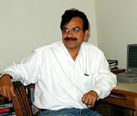 |
Rana Jawad Asghar, MD. MPH.
( Co-ordinator of South Asian Public Health
Forum)
Dr. Jawad is currently working on a child
survival project in Mozambique. Before this he worked as a faculty member
at the London School of Hygiene and Tropical Medicine. He also worked for
Stanford University as a Research Associate in the Division of Infectious
Diseases, and Geographic Medicine. He has also worked as a consultant for
different organizations and governments.
He did his Masters in Public Health (Epidemiology
Dept and International Health Program) at the University of Washington. He
was a Fellow of Emerging Infectious Diseases there. As a TA he worked for
a year on the Graduate Certificate Program for the CDC Field Assignees and
for a year he worked as a Teaching Assistant for classes on International
Health and Research Methods for Developing Countries. He also worked as an
Intern at the World Health Organization in Geneva in Emerging Infections
Division.
He writes for different newspapers and
journals. His recent Op-Ed was published by the Los Angeles Times and was
reproduced by different US newspapers and UN wire services.
He
did his basic medical education in Pakistan from Allama Iqbal Medical
College, and MCPS from College of Physicians and Surgeons. He was a
Franklin Adams Scholar for a year in the Bristol University, UK in the
department of Epidemiology.
|
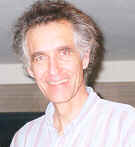 |
Stephen Bezruchka
Stephen
Bezruchka has spent many years working in Nepal, setting up a community
health program in a remote area in the west, training Nepali doctors in a
remote district hospital, and most recently, working with Nepali surgeons to
improve surgical care in remote hospitals by hands-on teaching of medical
officers posted there. He has also consulted, and traveled widely throughout
the country. He is interested in determinants of health of populations in
both rich and poor countries, and in the effects of medical care on
population health. In the USA, he works as an emergency physician in
Seattle. He teaches courses in qualitative research, population health, and
comparative health systems in the Department of Health Services at the
University of Washington.
|
|
John Bryant
Dr. Bryant has been one of the foremost
leaders in international public health for the past 3 decades. He has served
the world of clinical medicine, public health and international bioethics
throughout his long and stellar career. Dr. Bryant was one of the first US
citizens to be funded for international public health in the developing
world; served the United States government; led a top academic center in
public health in the US; and developed a world-class community-based
teaching and research program in South Asia.
He
is recognized as an authority in several aspects of the field of public
health and serves as the honorary President of the Council for International
Organization of Medical Sciences (CIOMS), which has put forth 2 leading
international ethical guidelines in research this decade. His contribution
to the field of bioethics, and especially the implementation of health care
and research ethics, is a source of inspiration. His knowledge of
international settings, both in the South and other parts of the world, have
contributed to the understanding and implications of international work in
public health in this country. As the a former Dean of the School of Public
Health at Columbia University, Professor Emeritus of the Agha Khan
University in Pakistan, representative to the WHO World Health Assembly for
decades, and President of CIOMS he is already in touch with the global
community of ethicists, philosophers and health professionals.
|
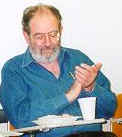 |
Oscar Gish
Oscar Gish is a faculty member at the School
of Public Health and Community Medicine of the University of Washington.
He has been teaching in the International Health Program in the
Department of Health Services of the School for the last 10 years.
Prof. Gish was educated in Europe in the
1960s in economics and the social sciences. He has been active since then in
many countries of Africa, Asia,the Americas and the Middle East,including
longer periods in Tanzania,Ethiopia and Indonesia. He has engaged in health
sector research and been a consultant in almost all the countries of South
Asia.
In
addition to the University of Washington,he has taught at the Universities
of Sussex (U.K.) and Michigan,and been a consultant and staff member of the
World Health Organization. He has published widely on issues of health
planning and health economics,and health and other social issues in
development.
|
 |
DR. ADNAN ALI HYDER
Dr. Hyder is a faculty member of the
Department of International Health at Johns Hopkins University. In addition
to being an Assistant Scientist with the Division of Community Health &
Health Systems, he is the Associate Director of the Doctoral program in
International Health and joint-faculty at the Johns Hopkins Bioethics
Institute. Dr. Hyder serves as a Long Term Consultant to the Global Forum
for Health Research and a consultant to the World Health Organization and
Council on Health Research for Development in Geneva. He has also been a
consultant to the World Bank, the Aga Khan Foundation, the US Department of
Health & Human Services and other international organizations.
Dr. Hyder has published and worked for several years on issues related to
health systems development in developing countries. His current research and
teaching interests include, burden of disease method, decision making and
resource allocation in health, Injury prevention and control in developing
countries, Biomedical and international health research ethics.
His work has a South Asian and African focus at the present time with
national capacity development as a prominent feature in most of the work.
Dr.
Hyder obtained his MPH and Ph.D. degrees from Johns Hopkins and his MD from
the Aga Khan University in Pakistan. He holds adjunct faculty titles in
institutions in Pakistan.
|
 |
Gregory Pappas, M.D., Ph.D.
Dr. Gregory Pappas is Senior Policy Advisor
to the Assistant Secretary for Health/Surgeon
General,
David Satcher in the Department of Health and Human Services.
Dr. Pappas works in a number of areas including disparities in health
and global health ( HIV/AIDS,
other infectious diseases, and health information systems development).
Previous to his current position Dr. Pappas directed the Office of
International and Refugee Health, Department of Health and Human Services.
Dr. Pappas received his M.D. and Ph.D. (Anthropology) from Case
Western Reserve in Cleveland, Ohio. After
doing his clinical training, he came to Washington DC, first in a fellowship
in Epidemiology, then continuing as a scientist at the National Center for
Health Statistics/CDC. Dr.
Pappas is author of numerous articles, including
his work in the New England Journal of Medicine “The increasing
disparity in mortality between socioeconomic groups in the United States”
and his book with Cornell, The Magic City: unemployment in a working class
community. Most recently he has published a book with the government of
Pakistan, “Health Profile of the Pakistani People” which is based on a
national health examination survey of 18,000 people.
Dr. Pappas is on the faculty of the Johns Hopkins School of Hygiene
and Public Health in the Department of Health Policy and Management.
Dr. Pappas is Chair
of the Science Board of the American Public Health Association and
Member of the Executive Board of APHA.
|
 |
Omar A. Khan
Associate
faculty, Johns Hopkins University School of Public Health (Project Officer,
Baltimore AIDS Project; Project Coordinator, South Asia Infectious
Disease Network) -Adjunct Assistant Professor, Health Services Academies,
Pakistan -Co-President, Cyberdocs -Honorary Adviser (Bioinformatics), Indian
Council for Medical Research -North American Liaison, International AIDS
Conference 2000 (www.aids2000.com) -Co-Chair, International Health
Geographics Conference 2000 (www.jhsph.edu/ihgc)
|
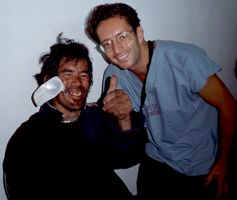 |
Dr. Geoffrey Tabin
"Dr. Geoffrey Tabin graduated from Yale
in 1978, received his M.A. from Oxford (on a Marshall
Scholarship), and his M.D. from Harvard in 1985. He completed his residency
at Brown University and corneal fellowship at Melbourne University. He
directed the Golchha Eye Hospital in Biratnagar, Nepal and
is now codirector of Himalayan Cataract Project (Nepal), as well as
Assistant Professor of Medicine at the University of Vermont.
Dr. Tabin is also a distinguished mountaineer, being the 4th person to reach
the highest point on all 7 continents. He scaled Mt. Everest in 1988."
|
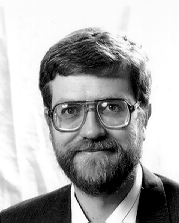 |
Sten
H. Vermund, M.D., Ph.D.
Professor
Department of Epidemiology and International Health
University of Alabama
Sten Vermund is an infectious disease
epidemiologist with experience in tropical parasitic diseases, sexually
transmitted infections, and in virus-neoplasia interactions. His current
research activities include: clinical epidemiology of HIV/AIDS in Alabama,
HIV in adolescents, human papillomavirus and cervical disease, correlates of
protective immunity in HIV exposure or disease progression, HIV in
developing countries, Pneumocystis carinii molecular epidemiology,
infectious etiologies of early pre-term birth, and the ecology of oral
microbial flora.
He is on the Executive Committees of the UAB
Center for AIDS Research and Center for Social Medicine and STDs and also
holds an appointment in the Comprehensive Cancer Center, where he heads the
Epidemiology Interest Group. Furthermore, he represents the School of Public
Health on the University's Research Advisory Committee.
He
teaches EPI 601- Vaccinology, EPI 681/781- Special Topics in Epidemiology
Research: Advanced Topics in Infectious Disease Epidemiology, Epidemiologic
Methods and Practical Aspects in the conduct of Clincal Trials. Dr. Vermund
is also Director of Division
of Geographic Medicine, Department of Medicine.
|
|
![]()